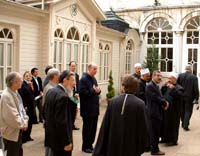| |
|
 |
International Interfaith Investment Group launches on April 11
April 8, 2005:
 |
 |
 |
The Steering Group of 3iG at a meeting in Istanbul, hosted by the Ecumenical Patriarch |
PRESS RELEASE APRIL 8 2005.In the business world, the usual definition of a “good investment” is one that simply makes more money. However at a unique meeting next week (11th to 13th April) seven world religions with total portfolios running into the billions, have decided to redefine what makes an investment “good” and to then put that into practice.
For them, a “good investment” is one which helps create a better world – and still produces a high long-term financial return.
Joined by philanthropies, banks, charities, foundations, businesses and socially responsible investment advisory groups, finance officers from various organisations within the seven faiths will launch the International Interfaith Investment Group (3iG), in London to help religious owned and managed stocks and shares to move into socially responsible investing (SRI).
 |
| Now, a new question is being raised. What will the faiths invest in positively, to make sure that their investments are in line with their beliefs? |
|
 |
 |
There is a long tradition of the world’s faiths knowing what they will not invest in – be that anything to do with charging interest for Islam, alcohol for Methodists, armaments for Quakers and animal products for Hindus. In recent decades this has also includes withdrawing investments from businesses involved in apartheid South Africa or in environmentally destructive practices.
Now, a new question is being raised. What will the faiths invest in positively, to make sure that their investments are in line with their beliefs? This “faith consistent investing” offers a dramatic new role for the faiths in helping fund, bankroll and even create a world that reflects the values, beliefs and teachings of their faith.
 |
| The faiths own 7% of the habitable land surface of the planet and they administer literally millions of buildings, community facilities, welfare networks, youth clubs, employment projects etc. Their salaries, pensions and the upkeep of their temples, churches, mosques, synagogues and other buildings are largely funded through their historically accrued stocks, shares and land assets. |
|
 |
 |
So for example, the areas of water, forestry, micro-finance and labour dignity as initial areas for investigation and potential investment openings and opportunities. After all, it can be argued that companies that take their environmental responsibilities and employees seriously will pay dividends in the future. Other topics such as alternative energy, sustainable housing and health care are also on the table for potential development.
This is not charity. The great faiths are in the business of religion – they run for example 60% of all medical care in Africa and 40% of all schools on the continent; they manage 70% of all tourist sites around the world; they own 7% of the habitable land surface of the planet and they administer literally millions of buildings, community facilities, welfare networks, youth clubs, employment projects etc. They are in the business of being “good religions” and this is largely funded through their historically accrued stocks, shares and land assets. Therefore, they want and need a good return, and now they are actively seeking how that can also be because they have invested in good businesses.
The meetings on Monday and Tuesday will be held at Dartmouth House, Charles St, W1. On Wednesday the venue will be the Montagu Centre, 21 Maple Street W1. All of the sessions are open, and the keynote speech will be given by the Rt Rev Rt Hon Richard Chartres, Bishop of London and Commissioner for the Church of England – on Monday at 4.30.
|
 |
 |
|
|
|
|
|

